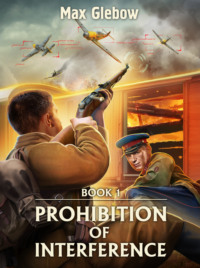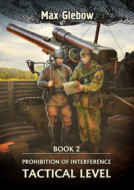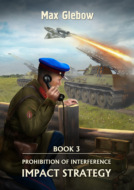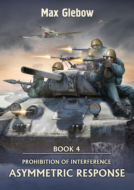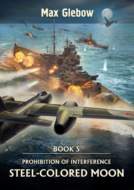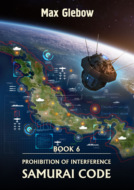Kitabı oku: «Prohibition of Interference. Book 1», sayfa 3
Chapter 4
We spent the rest of the day helping the wounded and burying the dead. We had no means of communication, and even if we had any, it was burned up in the bombed-out cars.
There was no movement on the railroad either from Uman or from the rear, but several times German bombers and fighter planes flew close to us. We heard explosions and the rumble of artillery cannonade. The situation on the front continued to deteriorate rapidly.
We had no means of transporting the wounded. Stretchers made from cape-tents and poles cut out in the nearby woods made things a little easier, but all the same our marching unit looked like a walking hospital. There were no medics among us, so there was nothing we could do to help the wounded except for primitive bandaging.
The NKVD platoon commander, with 12 men left, tried to hold on, but the defeat of the train was an unbearable burden on him. The First Lieutenant seemed to think that he was responsible for everything that had happened.
“Comrades Red Army men, if anyone else does not know, I’m First Lieutenant Fyodorov. I am assigned to accompany your military echelon, which means I am your commander. And if that's the case, everybody listen to the battle order!” he said it in a hoarse voice as he strode in front of our uneven line, “We are now moving in a marching column to the west along the railroad tracks. We'll take turns carrying the wounded. It's evening, but we can't stay here overnight – they're waiting for us in Uman. That's where you should all get your weapons and assignments to your units. We'll walk all night if we have to. Any questions?”
I was about to ask why we, unarmed and with wounded in our arms, should go into the trap into which the outskirts of Uman were turning, but after looking into the eyes of the First lieutenant, I changed my mind. People here thought in very different terms, and no amount of reasoning could shake this officer's determination to follow orders and get us to our prescribed destination. Besides, the First Lieutenant didn't know what was really going on around us right now, and I couldn't plausibly explain to him how I knew it.
Nevertheless, our temporary commander noticed something on my face. After the fight was over, he looked in my direction regularly, but he never asked me anything until then.
“Soldier, do you have a question?” The First Lieutenant turned his whole body toward me.
“Red Armyman Nagulin,” I introduced myself and took a step out of the ranks, “Comrade First Lieutenant, we are going to the front. The situation is not quite clear, but from the looks of it, it has deteriorated a lot in recent hours. We have the rifles of your dead fighters and the machine gun platform crew. Right now your people are carrying them, but maybe it makes sense to distribute these weapons to us?”
“If we have to, we will,” the First Lieutenant answered sharply, without explaining anything, “Get the stretchers up with the wounded! We're moving out.”
“Comrade First Lieutenant…”
“Follow your orders, soldier. Or should I repeat it?” The First Lieutenant squinted unkindly, and behind his shoulder a sergeant in NKVD uniform reached for his weapon.
Well, if I have to do it, I'll do it.
“Copy that,” I answered clearly, devouring the boss with my eyes, for I had absolutely no desire to see what would happen next if I began to insist.
“That's better,” the First Lieutenant mumbled in a completely hoarse voice and went in a wide stride toward the head of the column that had begun to move. The Sergeant looked at me unkindly for a while, but then turned around and ran after the commander.
Army discipline, especially in a combat situation, is undoubtedly a wonderful thing, but I had absolutely no intention of continuing to beg for a rifle from the commander. I just wanted to tell him that walking along the railroad tracks in the direction of the train to get to Uman is a futile matter. If we do that, after 40 kilometers, which is a lot for our column, we will be at the Khristinovka station. Only from there there is a branch to Uman, which goes almost in the opposite direction, to the southeast. Uman itself is now about 25 kilometers south of us, and if you go there, it is better to go straight through fields and woods, rather than along the railroad, which not only greatly lengthens the way, but also attracts the German air force like a magnet. The latter, of course, is not so scary right now, since it's already getting dark, and enemy planes won't appear over us until morning, but the fact that once we get to Khristinovka we will still find our troops there, and not the Germans, is highly doubtful.
“Well, Pyotr, have you got it?” I didn't notice Boris next to me as I pondered, “You talk a lot, and in all the wrong places. I also like to talk, but I always know where to do it and where not to do it. This is the NKVD, you have to understand. And you started discussing orders, and in a combat situation. Did you see how that sergeant was groping the rifle? No doubt he would have fired without hesitation, at one movement of the commander's eyebrow.”
“I don't doubt it,” I didn't argue, “I could see it in his face.”
“You've gone completely feral in your taiga, I see. Stick with me, or you'll get in trouble. Be thankful that nobody whispered to the First Lieutenant or his Sergeant about how you left the wagon without permission… Apparently, they've forgotten this episode out of fear. But now it seems calmer, so maybe someone will remember, if those who saw it are alive, of course.”
“It won't be for long,” I answered softly, and immediately regretted what I had said.
“What won't be for long? Have they forgotten that not for long? That's what I'm telling you.”
“No. That's not what I mean, I mean it's calmer now, but it'll be over soon.”
“What's going to be over?”
“The silence, if you can call it that. Do you have any idea where we're going?”
“Well, to Uman, the commander told you directly.”
“We're not going to Uman! Uman is over there!” I waved my hand to the south, perpendicular to the direction of our movement, “And these tracks lead to the Khristinovka station, which is 20 kilometers west of Uman. There will be a front line there any day now, or even by tomorrow morning! Do you hear that rumbling?”
“Does the commander know less than you?” There was a suspicious mistrust in Boris's voice, “He's got a map, too! Well, he should. And how do you know where Uman is? And about Khristinovka?”
“You just had to study well in school, Boris, not dream about girls in class. My father taught me – there was no school in the taiga. You live in the great country of victorious socialism, and you should know the geography of your immense motherland. Did you remember the names of the stations we passed?”
“Well…” Boris said in a lower tone, obviously not expecting such a rebuke from me, “it seems that we passed through Talnoye… And Yurkovka.”
“Do you have any idea where we are?”
“Not really, I'm from Voronezh…”
“Have you never seen a map of the USSR either? It's only 700 kilometers from here to your Voronezh, by the way. You can get there on foot.”
“Look, Pyotr, why are you picking on me? I realized that you know geography well.”
“Well, if you understand it, then there's no need to ask stupid questions. Let's better think about how to report to the commander that this railroad won't lead us to Uman.”
“It's no use,” Boris shook his head, “He won't listen to you, and he won't listen to me either. What are you suggesting? To turn into the fields and go straight ahead? But you can lose your way easily, as there are no landmarks. And the rails are right there, you can't get lost.”
“I'll show us out,” I said without proper confidence. I understood that, but I really didn't want to go where the First Lieutenant was leading us.
“Listen to me, Pyotr…” I could hardly make out Boris's grin in the darkness, “Do you believe yourself? At night, without a road, with the wounded in our arms, in unfamiliar terrain… It's not like you can drive your finger on a map of your home country in the warmth and comfort of your own home. No offense, but it's all nonsense. After all, we have an order, and it has to be obeyed.”
Then we walked in silence, gradually getting into the rhythm, and about 30 minutes later it was our turn to carry the wounded, and there was no time to talk.
* * *
No matter how hard the First Lieutenant tried to move quickly, but we still had to make three stops. The men were too exhausted for the day, and they were simply unable to endure the continuous march through the night while carrying the wounded. After the defeat of the echelon there were about 150 of us left. There were 27 wounded on stretchers, but by morning six of them had died, yet our losses did not end there. Apparently, I was not the only one who did not like the idea of walking blindly and unarmed toward the advancing Germans, and the fact that the front line was not far away could only be doubted by a deaf person.
At the last resting place just before dawn, the sergeant conducted a roll call on the orders of the commander. Our unit was 17 men short. I was beginning to understand why the First Lieutenant was so sour about my suggestion to give us the rifles of dead soldiers.
The morning greeted us unpleasantly. The indistinct roar that had sounded all night in the west had turned into a continuous rumble, in which individual violent explosions were already clearly distinguishable. But the worst thing was that it was now heard not only from the west, but also from the north and even from the northeast. It finally dawned on the First Lieutenant, too, that something wasn't going quite the way he wanted it to, despite all his unwavering determination to follow orders.
“Soldiers!” He looked at us with a frown, “Anybody here from these parts?”
The answer to the commander was silence. We were all mobilized in the eastern regions of the country. Boris, with his Voronezh, was probably the most western of us, so we couldn't please the First Lieutenant in any way. Well, almost.
“Red Army man Nagulin!” I went out of the line.
“You again?” The First Lieutenant's voice had a bad tone to it, “Are you from around here?”
“No, Comrade First Lieutenant. But I can draw a schematic map and roughly show you where we are.”
“A schematic map, then?” The commander said thoughtfully, looking at me frowningly, “Where did you come from, Red Army man Nagulin? You're newly mobilized, right? You haven't even had basic training. In fact, you should have been sent to the reserve unit first, but that's just the way it is. But you're a good shot with a rifle, I've seen it myself, and now it turns out you can read a map, and not only read a ready-made map, but draw your own. Where did you learn?”
“My father taught me. We lived almost on the border of the USSR with the Tuvan People's Republic. He was an Old Believer, he was educated in Czarist Russia, and then his grandfather finished his schooling on our farmstead. I grew up in the taiga, so I'm a good shot and I know how to handle weapons. And I've been interested in geography since childhood. I dreamed that when I grew up, I would travel and discover new lands. I know this area from the map quite well, but I have not been here myself before.”
The First Lieutenant didn't believe me, he didn't believe me at all, but nodded and took a notebook and a chemical pencil out of his field bag.
“Draw your map, Nagulin, but watch out if you lead us to the Germans…”
“Comrade Commander,” I tensed up as I drew the railroad line from Talny to Khristinovka and a little further to show the general direction to Teplik, “I, like you, don't know where the enemy is now. I'll draw a map, but it's not for me to decide where to go.”
Fyodorov only nodded silently, showing that he had heard me, and continued to watch attentively as on a sheet of his notebook the railway line leading from Khristinovka to the southeast to Uman was appearing, and as I marked these settlements.
“What about roads, rivers, bridges, woodlands?” asked the First Lieutenant when I handed him the prepared diagram.
“My memory also has its limits, Comrade Commander,” I answered, “I depicted what I remember. According to my rough guess, we are somewhere around here, about 15 kilometers from the Khristinovka station.”
“So you're saying that all night we walked the wrong way and didn't get even a meter closer to Uman?”
“That's right, Comrade Fir…”
“Silence!” bellowed Fyodorov, “Why didn't you report at once?!”
“I tried, Comrade First Lieutenant. You wouldn't listen to me.”
The First Lieutenant was silent as he continued to glare at me. He didn't have anything to say, but he seemed to really want to grind me down. Yes, I know how to make enemies, and I need to do something about it.
“Get in formation,” he finally ordered, putting my map away in his clipboard, and turned to our thinned out team, “We continue along the railroad tracks. At the nearest station we will hand over the wounded to the medics, report back to Uman, and get further instructions. Get the stretchers! Start moving!”
The situation was worse than I thought. Fyodorov did not want to admit his mistake, or maybe he just thought his actions were right. The idea of getting help at the station would have made perfect sense if it weren't for the constant rumble of the front line coming toward us.
Satellites broadcast a bleak picture from orbit. The Germans had already captured the Khristinovka station, where our commander was so eager to go. The railroad track in several places in front of us and behind us was smashed by enemy bombs. In addition to our train, two more trains were burning out on the tracks, and under the circumstances, no one was going to repair anything or remove the burnt-out cars from the tracks, nor would they have been able to do so if they wanted to. And to the north of the railroad we were rapidly encircled by the 16th motorized division of the Wehrmacht, which had almost reached Talny, and the troops defending there were clearly unable to prevent the Germans from capturing this settlement. Behind our back in the east Novoarkhangelsk was still in the hands of the Red Army, but it was already being approached from the south by the 11th German Tank Division and the SS Division Leibstandarte.
Counterattacks organized by the Southwestern Front command struck with extreme fierceness, but they crashed against the viscous defenses intelligently built by the Germans, meanwhile, the threat of a complete encirclement was already clearly looming over the 6th and 12th Soviet Armies, as well as the remnants of the Second Mechanized Corps. The battle was simmering all around us, but by some miracle our unit had not yet been directly affected, except, of course, by the destruction of the train in which we were on our way to the front.
Something had to be done urgently, otherwise our commander, who was unreservedly devoted to the cause of Lenin-Stalin but was completely inadequate, would lead us into German captivity, which was absolutely not in my plans. Except that I didn't yet understand exactly what to do.
Our luck ran out after about 15 minutes. First, a lone I-153 Seagull fighter with red stars on its wings flew almost over us to the east, which caused great excitement in our column. The plane was going low and clearly had combat damage, but I was the only one in our squadron who saw it. The rest of the soldiers waved their hands and caps, welcoming the first representative of Soviet aviation they had seen since the defeat of our train. And then I felt the familiar unpleasant itch behind my ear.
The First Lieutenant was now walking somewhere ahead, and I was just carrying a stretcher, so there was no way to get to him. But not far away from me was the Sergeant who had made it so clear to me how discussing the commander's orders in a combat situation could end up.
“Comrade Sergeant! The enemy is ahead! I hear the sound of motorcycle engines a kilometer to the left of the road behind a wooded area!”
“Column, halt!” I have to hand it to him, the Sergeant reacted seriously to my warning. He ran off to find the commander and soon the two of them were back together.
“Quiet, everybody!” The First Lieutenant commanded and listened intensely to the silence, which was very relative, for there was a good deal of rumbling all around us.
“There's nothing there!” After ten seconds, the Sergeant said, catching the commander's questioning look on his face, “I don't hear any suspicious sounds.”
Of course he couldn't hear! At this distance, the woods reliably muffled the sounds of the engines, but there was nothing else I could explain my knowledge of the approaching German motorcyclists. And they were not the only ones…
“There are at least three motorcycles and something else, heavier, but not tanks. Maybe a truck, maybe an armored personnel carrier – something is clanking there,” I reported, stubbornly looking into Fyodorov's eyes, “Over there, see? There's a road along the rails. Then it goes to the left and turns behind the forest. That's where they're coming from.”
The First Lieutenant hesitated, but action was needed immediately, and he made up his mind.
“Zhurkov, Blokhin, move forward and carefully check around the corner. The rest of you, take cover behind the embankment. Quickly! Not this side! The opposite side of the road! Sergeant Pluzhnikov!”
“That's me!”
“Keep an eye on Red Army man Nagulin!
“Copy that!”
As expected, Fyodorov's men did not make it to the road's bend. What could they, tired from the long march, do to compete with the BMW engines?
Two motorcycles with strollers jumped out from behind the woods almost simultaneously. Five seconds before Blokhin and Zhurkov heard the sound of their engines and rushed to the side of the road, simultaneously waving their hands at us. Instead of hiding behind some cover, the two NKVD fighters raised their rifles and opened fire on the Germans. It couldn't be helped – they've been taught that way, and they've learned their lesson well.

BMW motorcycle, with an MG-34 machine gun on the side trailer. Various models of such motorcycles were widely used by the Wehrmacht during World War II.
The motorcycle in front swerved to the side. The driver may have been injured, but did not lose control of his vehicle. Apparently, this was not the first time these Germans had encountered the enemy, and they were largely prepared for such a situation. In any case, the machine gun on the second motorcycle fired a long burst just five seconds after the NKVD fighters' first shot.
Blokhin fired from full height and was the first victim of return fire, catching several bullets with his chest at once. Zhurkov, apparently, had some combat experience and behaved more intelligently. He rolled into a shallow ditch and tried to shoot the motorcyclists from there, but the forces were too unequal. The soldier was simply destroyed by the fire of two machine guns.
I lay behind a low embankment and thought, with an inner shudder, that now our First Lieutenant would rise to his full height and try to raise us to attack – with a dozen rifles for his men and bare hands for the rest of us. However, it did not happen.
“Sergeant, distribute weapons to the Red Army men!” Fyodorov ordered softly, but clearly.
“There aren't enough rifles for everyone, Comrade First Lieutenant. Who do you want to give them to?”
“Give one to Nagulin. To the others, as you can.”
“Yes.”
The Germans, meanwhile, had stopped. One of them was helping a wounded man at the motorcycle closest to us. The driver of the third motorcycle, which appeared from around the corner, immediately turned his vehicle around and drove back. Apparently, he was going to report the incident to his superior. Another German was moving slowly toward Fyodorov's position, trying not to block the range of fire of the machine gunner protecting him.
I finally got my hands on a gun and three cartridge magazines. Five rounds in the rifle and another 15 in the ammo bag. Not much, but thanks for that, too.
The enemy motorcyclists made sure that none of the attackers remained alive and settled back into their vehicles, taking the weapons of the dead. The wounded man was taken to the rear, while the remaining Germans waited for their comrades, who had gone to report to the commander, and once again rolled leisurely down the road toward us.
“Squad, to battle!” Our First Lieutenant, who knew no doubt, gave the order. The enemy must be destroyed wherever you meet him, and by all the means at your disposal. Such was the paradigm of this cruel time. Red Army soldiers and commanders were taught this in army manuals, and it was drummed into them in numerous classes by teachers and political officers until it became an integral part of their consciousness. The good thing, at least, was that Fedorov was aware of the importance of the effect of surprise, and gave the order quietly enough.
I decided to try to prevent this madness after all.
“Comrade First Lieutenant, there, just around the corner, are two armored personnel carriers with infantry and several more trucks!”
“You know too much, Nagulin!” hissed the First Lieutenant, “Maybe I shouldn't have given you that rifle. Why don't you tell me where they came from? And where are our units?”
“You know what I mean, Comrade First Lieutenant,” I answered softly, fearing greatly that I might be told to be silent again. But apparently the advance warning of the enemy had given me some credit in the eyes of my commander, and he preferred to hear me out after all.
“If the Germans are already here, it means that the Khristinovka station has long been captured by them, and the front is broken through. Our units apparently withdrew to the south and north. No cannonade can be heard in front, but on the right and especially behind, the rumbling grows stronger and stronger.”
Of course, I didn't say everything I knew. The Germans we ran into were one of the forward units of the 125th Wehrmacht Infantry Division. We were already so far into the mousetrap that Uman and its environs have become, that there were no normal escape routes left. To break through to the west would be pure madness. Even if there are Red Army men there, they are only the remnants of defeated and surrounded units. There was also no point in going north, in the direction of Kiev. The place was now packed with German infantry, which was pulling up after the motorized units that had moved forward to Talny. And even if we had broken through there, we would not have had any prospects, because we would have fallen into a new, even larger pocket, which was also already marked with all certainty around the capital of Soviet Ukraine. Three selected German divisions, two of which are tank divisions, are waiting for us in the east, and we have absolutely nothing to gain in this direction. That leaves the south, but there we will at best find units of the 6th and 12th Armies surrounded. Of course, this is much nicer than being taken prisoner by the Germans right away, but it's also pretty bleak prospect.
“Stop panicking, soldier!” said the First Lieutenant, as if trying to kill me with his gaze, but somewhere in the depths of his pupils I saw uncertainty and even fear. The Commander understood that I was right, he understood it very well, but he tried not to show it in front of his subordinates.
“That's right, Comrade First Lieutenant,” I answered, raising my hand to my cap, “We have one way left – to the south. That's where our units should be. At least they'll give us normal weapons. And with two dozen rifles against five machine guns we'll achieve nothing anyway, we'll just lay here all for nothing, without doing the enemy proper damage.”
I saw something very bad in the looks of the First Lieutenant and the Sergeant. I don't even know how it would have ended for me, but then the first Hanomag came out of the woods, roaring with its engine and clanking its caterpillars. I could clearly see a machine gun mounted on top of the cabin of the armored personnel carrier and rows of helmets above the armor.
“We'll finish with you later,” Fyodorov told me, and, ducking down, ran somewhere to the right flank, “To the battle! Squad, fire on the Nazi invaders!”
Well, that was it. Let him throw himself under the tracks, but there are more than a hundred young guys, most of them unarmed! I grabbed my rifle comfortably and looked around. Shots rang out around me indiscriminately, and the unarmed men just lay on the ground, keeping their heads down to avoid the hail of bullets that rained down on our low shelter from two sides – from the motorcycle patrol that had gone forward and the Hanomags that crawled out from behind the forest. German infantrymen were already jumping briskly out of the backs of armored personnel carriers and taking positions in the ditch, clearly preparing for an attack.
“Why aren't you shooting, Nagulin?” the deputy commander roared above my ear.
“I am choosing my position, Comrade Sergeant,” I answered as firmly as possible, “We have to shut up the machine guns, or we'll all get killed here.”
“Fire, soldier! Or I'll shoot you myself!”
“You can shoot me after the battle, Comrade Sergeant, but right now don't get in the way,” I answered angrily and crawled a few meters to the left, where a dust cloud rose from the machine gun burst that had recently rattled on the embankment.
Continuing to test the sergeant's patience was simply dangerous. I closed my eyes for a second to look at the battlefield from above. The greatest threat to us now, oddly enough, was not the Hanomags, but the two machine guns on the motorcycles that passed us by. These Germans were much closer to our position and shot much more accurately than the machine gunners from the armored personnel carriers.
I targeted the motorcycle closest to us, relaxed my arms and shoulders a little, went into combat mode and with a sharp movement I lifted myself slightly above the embankment. The plop of my shot was lost in the crackle of machine gun bursts and rifle fire. I didn't look at the result and immediately hid behind the embankment. Nevertheless, I was spotted, and several bullets struck the rails at once with a rumble.
“One down,” I told the Sergeant, once again taking advantage of the 'view from above', I'll change position and silence the other.”
“Are you sure you hit him?” Pluzhnikov asked incredulously.
“I'm sure,” I nodded affirmatively, “but I don't recommend checking right now. I'll calm down the other one, then it will be safer.”
“He doesn't recommend…” The Sergeant started, but I wasn't listening, crawling quickly to the left.
Shot! A sharp pain jerked my temple, but I didn't even notice it right away. This time the Germans seemed to be purposefully waiting for my head to appear over the rails, though not quite where I actually ended up. But the German gunner showed excellent reaction. I was lucky that it wasn't a bullet that hit me in the head, but a pebble that it knocked out of the embankment. But it rang a very bad bell for me. If I keep getting exposed to enemy fire like this, my glorious journey on this planet may be over before it has even begun.
“It's done,” I nodded to the Sergeant.
Machine gun fire on our flank subsided, and Pluzhnikov peeked out from behind the embankment to assess the situation.
“Three of the four Germans are intact,” he said as he crawled back down, “They're at the machine guns. One is behind the motorcycle, but he's moving – wounded, probably. And you said you took down two.”
“Are the machine guns silent?”
“Silent,” agreed Pluzhnikov.
“Both of them?”
“Both.”
“So I've done my job. Now, Comrade Sergeant, I have a reasonable initiative, but I need assistance. Will you render it to me?”
Pluzhnikov didn't have time to answer. We were interrupted by the distinctive pops of shots from German infantry mortars. It would be foolish to hope that the forward section of the German infantry division would forget to take this compact and very effective weapon with them. The Germans had such a Rheinmetal product in every platoon, and now we had the pleasure of experiencing what it was like, to have 50-millimeter mines dropped on your head.
“Get down!” yelled the Sergeant, obviously familiar with this enemy weapon.
I was lying down, but the Red Army men, huddled in a tight group along the embankment to our right, did not react immediately to the command. For the first time we were lucky and the mines fell short, but continuing to play this roulette game was not just dangerous, but criminal.
“Comrade Sergeant! We need to take the men away. Otherwise everyone will be chopped up! We don't even have individual cells dug, not to mention trenches, and the embankment won't protect against mines. There's a gully between the hills that's a good escape route. And there is a forest there…”
“There was no order to retreat,” the Sergeant cut off, lifting himself up over the rails and firing toward the enemy, “Don't you know the regulations, soldier? The enemy must be boldly and swiftly attacked wherever he is detected!”
I mentally groaned. If anyone here didn't know the regulations, it was the Sergeant and our Commander. So many great guys have already died because of that phrase, that was hammered by political officers into the heads of Red Army soldiers and commanders with wanton ruthlessness, it just made me want to howl. And no one even once remembered that this phrase refers only to OFFENSIVE combat, as the Red Army Field Manual of 1939 says quite unambiguously. What are we doing now? Are we fighting an offensive battle? But I couldn't have a military-theoretical debate with an NKVD sergeant right here, under mortar fire!
The second series of mines flew too far, but the embankment did not cover us on this side, and the cries of the wounded showed that the shrapnel had found its targets.
“I need your help, Comrade Sergeant,” I reminded Pluzhnikov, “We need to silence the machine guns on the Hanomags, or they'll keep pinning us to the ground, and the mortar men have almost zeroed in.”
Ücretsiz ön izlemeyi tamamladınız.
